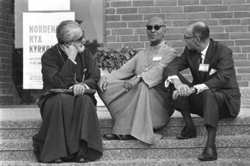Katharina Kunter came upon the World Council of Churches (WCC) as an object of research through the discipline of Cold War studies, analyzing the encounter of Christian bodies in East and West from the end of the Second World War to the fall of the Berlin Wall.
She soon came to realize that the interplay of “northern” churches with the global South was equally influential in transforming attitudes and practices of the WCC and its member churches during those decades.
Kunter and other scholars from the Karlsruhe Institute of Technology in Germany are exploring this facet of the “globalization” of Christian churches. Foundation grants and contributions from German church bodies have made possible a research project focusing on inter-regional dynamics and their effect on churches, particularly from the Second Vatican Council in the 1960s to the development of the WCC Program to Combat Racism and other social justice emphases through the 1970s.
The project has culminated in an international conference on the theme. Thirty-five participants gathered for the March 4-6 event at the Ecumenical Institute in Bossey, Switzerland.
In the seminar on global transformation and ecumenical renewal in the 1960s and 1970s, 15 lectures were complemented by panel discussions and a film on the 1968 WCC Assembly at Uppsala.
A highlight of the conference was a panel featuring three “perspectives from contemporary witnesses” within the ecumenical movement: Mercy Amba Oduyoye of Ghana, Julio de Santa Ana of Uruguay and Dwain Epps of the United States. Now retired, all three served the WCC in the final third of the 20th century.
Oduyoye recalled the late-60s and early-70s in the WCC as a period of increasing “inclusion of persons and issues from the margins,” a time when voices from the global South were heard more clearly and began to be given weight in decision-making.
Santa Ana cautioned that not everything should be remembered as showing “a happy face,” for the ecumenical movement often wore “a conflicted face” at the time: the dream of full “organic unity” of the church was dying, and there was substantial friction between different elements of ecumenism within the WCC.
Epps agreed that some tried to put barriers in the way of change, yet this eventually forced the various factions to engage one another in open, honest debate and to start anew on the path toward Christian unity.
Hans von Rütte, a Swiss historian and the newly appointed WCC archivist, participated in the seminar. During a final discussion at Bossey, he remarked, “I find this aspect of ‘globalization’ very helpful in forming my understanding of what I see in the WCC today.”
Ecumenical dimensions of East-West reconciliation and the meeting of North and South, he said, “have helped make the world more global ― that is to say, more multi-centric, more mutually aware.”
He added that the representative organizational structure of the council, together with the presence of congregations even in small communities, made possible direct connections and communication between local and global expressions of Christianity.
The WCC continues to work on challenges, tensions and opportunities presented by co-existing cultures and political systems, as well as by the encounter of western Protestantism with eastern Orthodoxy and the similarities and dissimilarities of “classical” academic theologies and regionally-based “contextual” theologies.
A report on the research project is to be produced, and presentations from the seminar are to be published.

